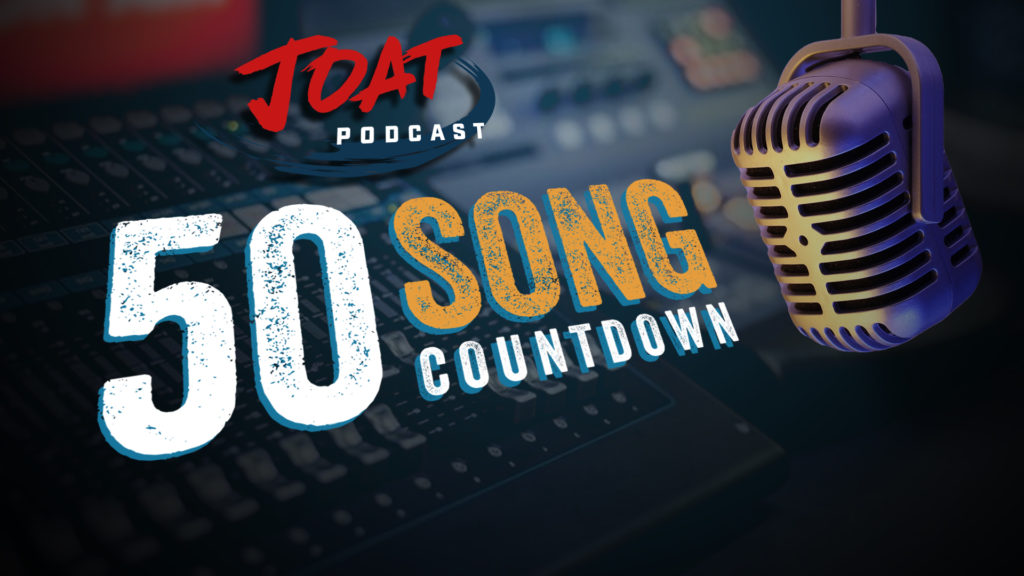The JOAT 50 Song Countdown is a blog series where every weekday for 10 weeks I am posting a brand new long form essay where I have ranked and written about my 50 favorite songs of all-time. From Adele to Zac Brown Band, Patsy Cline to Plasma Canvas, Ludacris to Rise Against, this series offers a personal essay about the 50 songs that hit me the absolute hardest.
The opening 28 seconds of “Under the Bridge” by Red Hot Chili Peppers represents maybe my favorite 28 seconds of guitar playing in all of music. Something about the quiet, intricate beauty of John Frusciante’s playing stops me dead in my tracks every single time it comes on. I’ve never seen Red Hot Chili Peppers live in concert, and I sort of don’t want to because when I listen to this song, I picture the music video where Frusciante stands on a platform wearing that weird outfit in front of a projection of a desert landscape. It’s perfect. It’s like a little 30 second concert just for me. And it’s so precious to me, even as a live music and concert freak, I don’t want to sully it with any other experiences.
I’ve written about this song before in what was the very first Top 5 Fun Friday I ever published on this site. In it, I associated this song with a very happy summer spent mostly at the pool when I was 10, which is sort of amusing when you contrast it with this song’s ostensible subject matter. I also wrote that “I have neither a heroin addiction nor any kind of particular affection for the city of Los Angeles” which is true, but which also intentionally and glibly misses the point.
A thing of beauty is a joy forever, and this song is undeniably beautiful. Like all great art, it exists in the paradox that Roger Ebert describes in his review of Brokeback Mountain. He writes of how the “cruel simplification” of it as “a gay cowboy movie” almost willfully misunderstands it. He writes:
“Strange but true: The more specific a film is, the more universal, because the more it understands individual characters, the more it applies to everyone. I can imagine someone weeping at this film, identifying with it, because he always wanted to stay in the Marines, or be an artist or a cabinetmaker.”
Anthony Kiedis has talked, notably in his book Scar Tissue, about how his heroin addiction led him away from his loving girlfriend and how “instead of embracing that, I was downtown with fucking gangsters shooting speedballs under a bridge.” Yikes. I can relate to the details of that sentence basically not at all, but who can’t relate to the sentiment that underlies it?
Who can’t recall a time where you found yourself wondering: What the fuck am I doing here? What even is this life? We’ve all found ourselves adrift at one point or another, and while we recall those moments with regret, shame or remorse, what we do as a result of those feelings often represents our life’s greatest triumphs. Maybe you left an unfulfilling career to make the leap into entrepreneurship. Maybe you decided to start creating art again after a lull. Maybe you finally ended a toxic relationship. Maybe you yourself got sober.
Those moments are lonely and isolating, but ultimately fortifying. We discover our resolve. We learn who we can count on. In Kiedis’s case, he felt like the city of Los Angeles looked after him like a guardian angel and this song reflects the bond he has with his beloved hometown. I often feel a kinship with my own city, so I relate to him on this level.
On a more important level, I’ve gone through enough shit by the age of 42 to know sadness is life’s most useful emotion. There’s a reason the movie Inside Out is my favorite Pixar movie by a wide margin, and one of my favorite movies, full stop. Wherever we are now is as a result of the many places we’ve been, and when we reflect on where we’ve been we mourn the life we no longer live, we miss the people we no longer see, we lament the times we were cruel or careless, we regret the choices we made (or didn’t make), or we mystify at the former person we no longer recognize. It’s a life tinged in blue.
But is that bad? I argue it isn’t because it also connotes growth, change or outright personal revolution. There’s beauty in the struggle and the transformation. That’s why Frusciante’s guitar playing touches me so deeply. Kiedis is sharing a deeply tender, vulnerable insight about himself that could turn dour or heavy at a moment’s notice. Yet when paired with the sunny melody provided by Frusciante and the other Chili Peppers, the song becomes one of hope rather than despair.
I used to think it was cool to be a cynic. Some of that was upbringing, some of that was simply the mother tongue of growing up in the 1990s, and some of that was my own insecurity. But cynicism is poison, and anathema to happiness. Optimism, while corny and toxic in too much measure, is far more rewarding and an animating feature of a life well-lived. We hope and we work for a better life tomorrow than the one we have today regardless of whether today’s life is great on its own or in a dark place. And we’re grateful for the forces, both seen and unseen, that help us along the way and watch out for us.
The music video is a constantly ebbing and flowing collage of superimposed shots over one another. This visual style is as good a representation of what memory feels like as anything I’ve experienced. Images emerge and recede, are suddenly replaced by others, switch without warning, take on ethereal color palettes, and reconstitute themselves into new formations suddenly and unpredictably. It helps that MTV used to play this song roughly 150 times a day for like a year straight, so I can recall it with stunning clarity.
We grapple with who we are constantly, and “Under the Bridge” is a reminder to me that no matter how dark our pasts or our memories might feel, with the right accompaniment, they can be recontextualized into the light. To be fortunate enough to choose the right circle is to know nothing in this world is too much to bear.
Up next: Number 2.


1 comment on “3. “Under the Bridge” by Red Hot Chili Peppers (1992)”